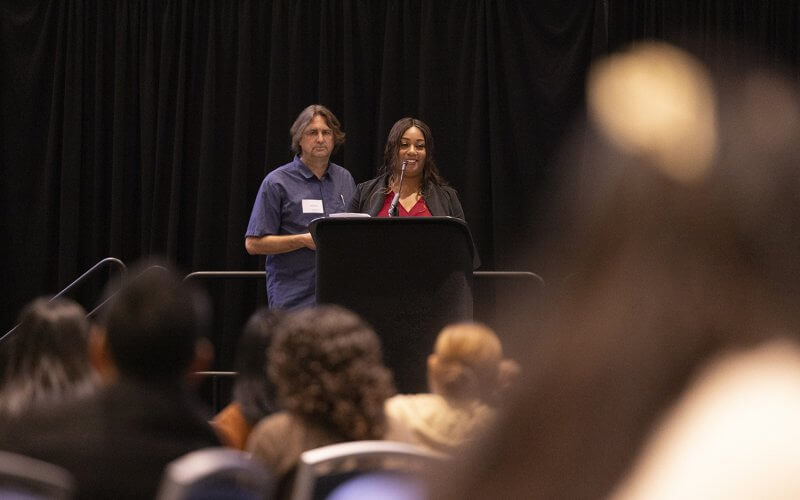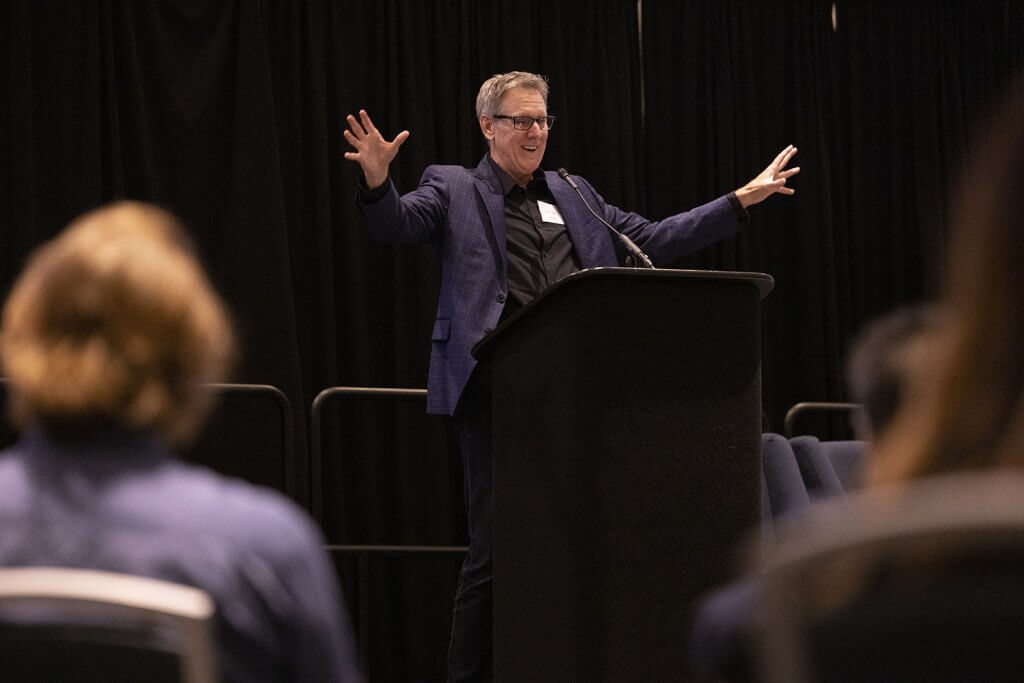
Alumna Stephanie Jeffcoat’s journey of homelessness spurred her interest in learning more about the challenges faced by people living on the streets.
“For many years, I was caught in a destructive cycle of addiction that slowly consumed every part of my life,” said Jeffcoat, founder of Families Inspiring Reentry and Reunification 4 Everyone, a nonprofit that offers support to individuals impacted by the justice system and homelessness.
Jeffcoat spent stints in jail and battled with drug addiction, relaying she lost hope after she gave birth to a daughter who was taken away from her because of her addiction.
The loss of her parental rights, repeatedly being arrested, and her car impounded with no place to sleep except on the streets fueled her to seek a new direction in her life.
After finding support at a shelter, she found work, enrolled in community college and earned five associate degrees. She transferred to Cal State Fullerton in fall 2022 and completed her bachelor’s degree in political science in August 2024. She plans to attend law school next fall.
“My story is a reminder of what is possible when someone is given the chance to break the cycle of hopelessness,” Jeffcoat said.
As an undergraduate, Jeffcoat partnered with Jon Bruschke, professor of human communication studies, on a pilot study to gather firsthand experiences from individuals living on the streets in Fullerton and neighboring Anaheim.
Jeffcoat shared her story and presented the research with Bruschke at the university’s inaugural “Housing Crisis and California’s Evolving Policy Environment Symposium.”
The Oct. 16 symposium was presented by the Office of Research and Sponsored Programs’ Titans Thinking Together initiative. Tabashir Nobari, assistant professor of public health, served as symposium chair.
“The purpose of the pilot study was to discover the causes of homelessness, the efficacy of different sorts of interventions and services, and what the unhoused perceive as the services they need to find stable housing,” Bruschke said. “But during interviews, we observed the various challenges people without homes face.”
Fostering Community Collaboration
More than 150 students, faculty, staff and community partners gathered at the symposium to address the housing crisis, identify barriers to services and permanent housing — and find solutions.
“We’re all united here by a common goal to address one of the most pressing societal issues of our times,” said Binod Tiwari, associate vice president for research and sponsored programs.
Tiwari said Titans Thinking Together aims to foster collaborative and cross-disciplinary research and strengthen the relationships between CSUF and the broader community to drive change on important regional, national and global issues.
Amir Dabirian, provost and vice president for academic affairs, relayed that the housing crisis also impacts CSUF students and other college students, with many facing housing insecurity and even homelessness.
“We are committed to tackling the housing crisis in Orange County and beyond, bringing together service providers, policymakers and the community to leverage their experiences alongside our faculty expertise and research to find innovative solutions and strategies,” he said.

Tim Shaw, chair of the Orange County Continuum of Care Board, delivered the keynote address and shared his perspective on humanizing people who don’t have permanent housing and dispelling myths and misconceptions about them.
“Every data point represents a life,” said Shaw, noting that over 500 individuals without housing died last year in the county. “People’s lives are literally on the line if we don’t do something.”
Breaking the Cycle of Homelessness
Bruschke and Jeffcoat conducted their research in June, funded by Titans Thinking Together. The researchers said their work is a step forward in creating change to provide better access to programs and services to get people into stable housing and break the cycle of homelessness.
Of the 62 individuals encountered for the study — living at bus stations, in parks, near fast-food restaurants and other outdoor spaces — about half agreed to be interviewed. Of those, most reported that information about available services, including housing support, is not widely accessible and found programs by word of mouth.
Individuals interviewed also lacked essential documents, such as social security cards and birth certificates, to obtain services and access to basic amenities such as bathrooms and showers.
“Negative encounters with police officers and demeaning experiences in homeless shelters tend to prevent people from using services,” Bruschke said.
Symposium panelists also noted that the low quality of services available often discourages people without housing from seeking them.
Almost all of those interviewed by Bruschke and Jeffcoat for the study, especially individuals who also face mental and physical health issues, prefer independent living support in apartments or motel rooms rather than shelters.
Jeffcoat said solutions must focus on treating people without homes as valuable human beings with real potential.
“Supporting the unhoused population goes far beyond addressing basic needs; it’s about giving people the dignity and hope they lost along the way,” she said.
“With the right resources, encouragement and compassion, we can help break the cycle. By providing shelter and services, we’re offering them the chance to rebuild their lives and regain stability.”
The faculty team will continue their research and collaboration with community partners and another symposium is planned for next year, Tiwari said.
For details about the study and findings, visit the research report. More information about the symposium can be found on the housing crisis website.